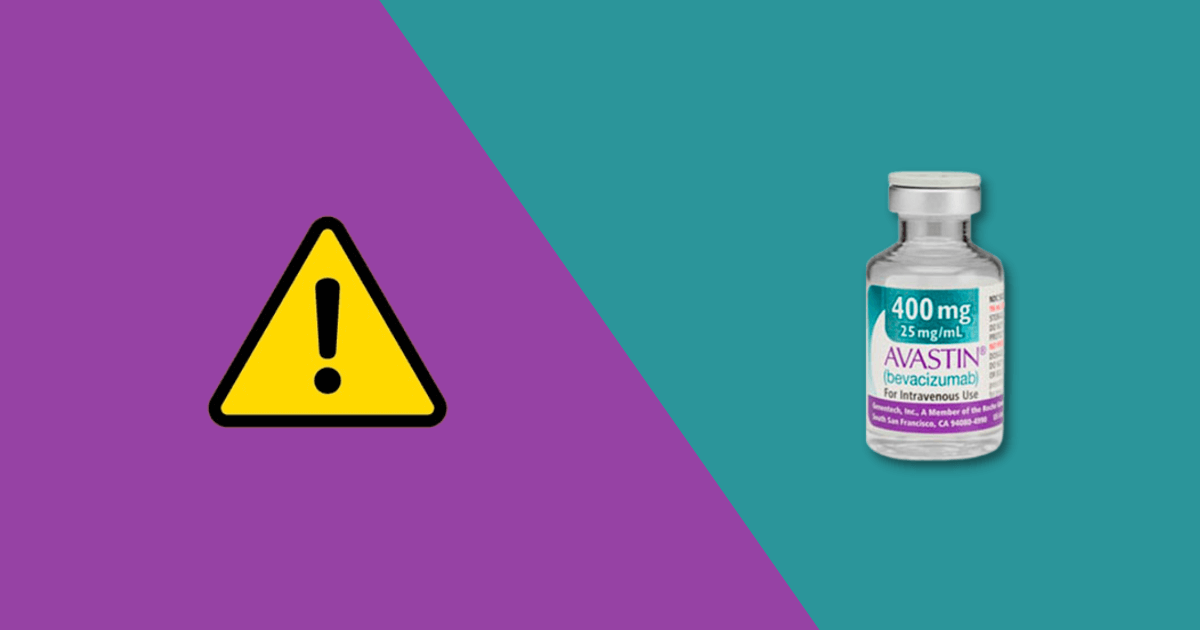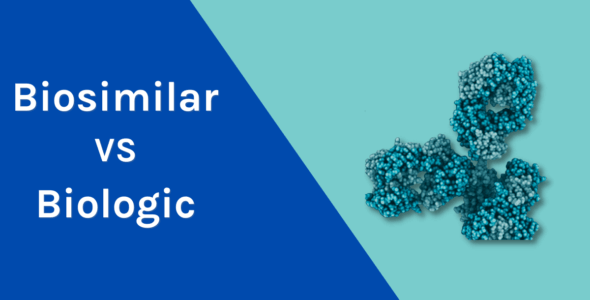Avastin side effects and how to avoid them
Table of contents
Avastin is an FDA-approved medication manufactured by Genentech, Inc., used to treat different types of cancers. While Avastin is generally well tolerated, there are some potential side effects that people should be aware of. The most common side effects of Avastin include headaches and back pain. Less common, but more serious side effects, can include high blood pressure.
Learn more about the side effects of Avastin and what you can do to avoid them.
What is Avastin (bevacizumab)?
Avastin is a cancer medication that’s prescribed to adults for the treatment of a range of cancers, including:
- Metastatic colorectal cancer
- Non-squamous non-small cell lung cancer
- Recurrent glioblastoma
- Metastatic renal cell carcinoma
- Epithelial ovarian cancer
- Fallopian tube cancer
- Primary peritoneal cancer
- Hepatocellular Carcinoma
What does Avastin do to your body?
The active ingredient in Avastin is called bevacizumab. It’s a type of biologic medication called a monoclonal antibody. This is a cancer-fighting protein designed to target and starve cancerous tumors of blood. When Avastin is given to you, the bevacizumab it contains is absorbed into the cancerous cells that make up your tumor(s). It then blocks a protein inside your cancerous cells called vascular endothelial growth factor A (VEGF-A).
VEGF-A is used by cancerous cells to create new blood vessels. This helps cancerous tumors create their own blood supply, which they need to receive the blood, and the oxygen and nutrients it contains, for the tumor to survive and grow. However, by blocking VEGF-A, bevacizumab stops your tumors(s) from creating their own blood supply, starving them of blood, oxygen, and nutrients. This makes it harder for the tumors to grow and makes them easier to kill with other cancer treatments, like chemotherapy.
Avastin dosage
Avastin is available in injection form in the following doses: 100 mg/4 mL or 400 mg/16 mL in single-dose vials.
Avastin is often prescribed alongside other cancer treatments, most often chemotherapy. The medication is given to you by intravenous infusion directly into a vein, usually at the same time as chemotherapy medications are administered by intravenous infusion. The amount of Avastin you require, how often you’ll need to take it, and what other treatments you’ll need will be decided upon by the prescribing doctor based on your cancer and your medical history.
You are advised to read the medication guide provided with this medicine for the drug information and patient information, and always speak with your healthcare provider for medical advice about any changes to your dose so they can monitor and evaluate your condition.
What are the side effects of Avastin?
The most common possible side effects of Avastin include:
- Dry mouth, cough, sore throat, changes in your voice changes
- Loss of appetite, diarrhea, vomiting, constipation
- Mouth ulcers
- Headaches
- Watery eyes
- Dry skin
- Nosebleeds
- Back pain
- Changes in taste
- An increased risk of bleeding
- Inflammation of the nose
- Inflammation of the skin
- High blood pressure
Avastin can cause more serious side effects, including:
- Dizziness, feeling light-headed, short of breath, sweating, chest pain, swelling in your face. These side effects may occur when you receive your injection
- An increased risk of blood clots that can cause heart attacks, strokes, and pulmonary embolism
- Heart failure – symptoms include swelling of your ankles and feet, tiredness, sudden weight gain
- Posterior reversible encephalopathy syndrome (a brain condition)
- Gastrointestinal perforations, tears, and holes in your digestive tract that can cause pain, bloody or tarry stools, vomit that looks like coffee grounds, constipation, and fever
- Kidney problems that can reduce kidney function and that can cause fatal kidney failure in severe cases
- The development of abnormal holes and passaged inside your body called fistula, which can be fatal in severe cases
- Severe high blood pressure (hypertension)
- Reduced white blood cells
- Impaired healing of wounds and surgical procedures
- Eye problems, including loss of vision
- Severe allergic reactions including anaphylaxis
- Damage to your ovaries if you’re a woman with ovaries, leading to ovarian failure in severe cases
If you experience any of these serious side effects, stop taking Avastin and seek medical attention immediately. You are encouraged to report negative side effects of prescription drugs to the FDA. Visit www.fda.gov/medwatch, or call 1-800-FDA-1088.
Are there any long-term side effects of Avastin?
Long-term side effects of Avastin include heart failure, hypertension, stroke, GI perforation, kidney problems, problems with wound healing, or early menopause. These side effects may continue even after you have stopped Avastin treatment.
How long do Avastin side effects last?
Avastin may remain in your system for around 4 months even after you have stopped using it. You may continue to experience certain side effects even after you have stopped treatment. Also, some side effects may reduce while you are still receiving treatment with Avastin. Speak to your doctor for medical advice if you are concerned.
Avastin drug interactions
Sometimes, medications can interact with each other. When this occurs, it can change how the medications work. Some side effects can also become more likely. Tell your prescribing doctor about all drugs you’re taking, including vitamins, and herbal and dietary supplements.
Avastin warnings & precautions
Avastin can harm an unborn baby. Talk to your doctor about taking Avastin if you’re pregnant or plan to become pregnant. Talk to your doctor about effective birth control if you want to take Avastin and you’re a woman who can become pregnant.
Don’t take Avastin if you:
- Are allergic to the active ingredient bevacizumab
- Are allergic to any of the other ingredients in Avastin
- Are under the age of 18
Talk to your doctor before taking Avastin if you:
- Are due to have surgery
- Due to have any kind of immunization or vaccination
- Are pregnant or are planning to become pregnant
- Are breastfeeding or are planning to breastfeed
You should always check with your doctor or pharmacist before taking any medication, including Avastin, to make sure it is safe for you.
What is the life expectancy after using Avastin?
Avastin may increase life expectancy by around 4 months.
Does Avastin cause joint pain?
Joint pain may occur while being treated with Avastin. Joint stiffness and swelling may occur at the same time as joint pain.
Does Avastin cause colon cancer?
Avastin does not cause colon cancer. Avastin is actually used to treat many different types of cancer including colon cancer.
Why was Avastin taken off the market?
Avastin was taken off the market as its risks were found to outweigh its benefits. It can however be prescribed off-label by your doctor. Off-label means it is not approved by the FDA (Food and Drug Administration).
How do you feel after an Avastin infusion?
Avastin may cause life-threatening infusion-related reactions. Symptoms may include fever, chills, dizziness, feeling light-headed or faint, trouble breathing, itching, or rash.
What kind of cancer is Avastin used for?
Avastin is used to treat a range of cancers affecting different parts of the body. This includes the lungs, liver, kidney, colon, cervix, fallopian tubes, and ovaries.
How long can you stay on Avastin?
Treatment with Avastin will usually continue for as long as it is effective in controlling your cancer.
How to avoid Avastin side effects
The best way to avoid side effects is to take Avastin as directed by your doctor. Follow your doctor’s instructions carefully and do not take more or less than prescribed.
If you experience any side effects, talk to your doctor or pharmacist. They may be able to recommend ways to help reduce or prevent some of the side effects.
1. Stick to the recommended dosage
Take your prescribed dose of Avastin that has been recommended by your healthcare professional. Do not take more or less than prescribed.
2. Monitor your blood sugar levels
If you have diabetes, it is important to monitor your blood sugar levels closely while taking Avastin. Check your blood sugar levels as directed by your doctor and report any changes to your doctor immediately.
3. Drink plenty of fluids
Drink eight to 10 glasses of water or fluids every day to help prevent dehydration, which can make side effects worse.
4. Avoid alcohol
Alcohol does not affect Avastin but may affect other medications Avastin is used in combination with. You are advised to avoid drinking alcohol while taking Avastin as it can increase your risk of side effects.
5. Don’t skip meals
Eating regular meals and snacks will help to prevent low blood sugar levels (hypoglycemia).
6. Check your feet
If you have diabetes, check your feet for any cuts, sores, or redness regularly. Tell your doctor if you experience any problems with your feet while taking Avastin.
7. Know the signs and symptoms of Avastin side effects
Signs and symptoms of side effects include headaches, dizziness, and feeling faint. If you experience any of these symptoms speak to your doctor for medical advice.
8. Monitor your weight
Avastin may cause weight gain or weight loss. If you experience this side while taking Avastin, get medical advice from your doctor.
9. Tell your doctor about all medications you’re taking
Be sure to tell your doctor about all other medications you’re taking, including over-the-counter drugs, vitamins, and herbal supplements, as they can interact with Avastin.
10. Get regular medical check ups
It is important to get regular medical check ups and monitor your medical conditions. Your doctor will monitor your side effects and may adjust your dose of Avastin as needed.
Medically reviewed
A medical professional has reviewed this article.


Jamie Winn, PharmD
Jamie Winn, PharmD
Dr. Jamie Winn received his Doctor of Pharmacy in 2002 from the University of South Carolina College of Pharmacy, Columbia, SC. Jamie is a medical reviewer for NiceRx.


